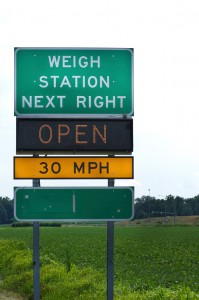
Weigh stations are an essential part of trucking safety.
In the trucking industry, there are various rules of the road to which all must adhere. If you have ever seen a weigh station, you’ve seen one aspect of trucking that not many passersby know about. The weigh stations are there to help everyone ultimately stay safe on the road. Below, you’ll find the “what,” the “how,” and the “where” about weigh stations.
The Purpose a Weigh Station
The weigh station used to be one way to collect tax to help mend roads damaged from the heavy weights of trucks. However, with today’s infrastructure, weigh stations now mainly serve as a safety inspection stop. An oversized load or a faulty vehicle could cause costly damages to roads, bridges, and other drivers present. As one of the bulkiest vehicles on the highway, it is important to periodically check the trucks for any safety issues.
How It Works
A Department of Transportation (DOT) inspector is the only person qualified to inspect a truck for vehicular and weight issues. All weigh stations are under the DOT, and a DOT inspector is the only person who can give an official evaluation of the truck’s status. He will check the truck’s gross weight, which is the total weight. He will also check that the truck follows all DOT safety guidelines.
Some weigh stations have scales that the truck must park on, while others have rolling scales where the truck can still keep moving while the scale calculates its weight. Some scales are portable for temporary or seasonal use.
Weigh Station Locations & Laws
One can usually find a weigh station close to U.S. state borders. Different states have different rules, so it is best to keep each station as close to the border as possible. They can also be found at choke points, where traffic gets heaviest.
For most states, only trucks that weigh more than 10,000 pounds need to go through the weigh station. If a truck qualifies in this category, it must stop at every weigh station it passes, unless it is closed.
Close to the truck scales is the scale house, the DOT inspectors’ office. If truckers fail to stop at a weigh station, a highway patrol can stop them and make them return to the station. Should the trucker fail to stop or fail part of the evaluation, the DOT could charge him with significant fines, suffer a delay of service, or even jail time and a CDL license revocation.
For All Your Trucking Needs
Follow us here at Evan Transportation to get more updates on driving tips and the trucking industry. Evan Transportation provides trucking and transportation services for clients throughout the Mid-Atlantic region. All of our drivers and staff are offered competitive salaries, benefits, and are guaranteed to be home every day. Interested in finding out more? Visit us online or give us a call at 443-673-3365. For even more information, visit us on Facebook, Twitter, Pinterest, and LinkedIn.
